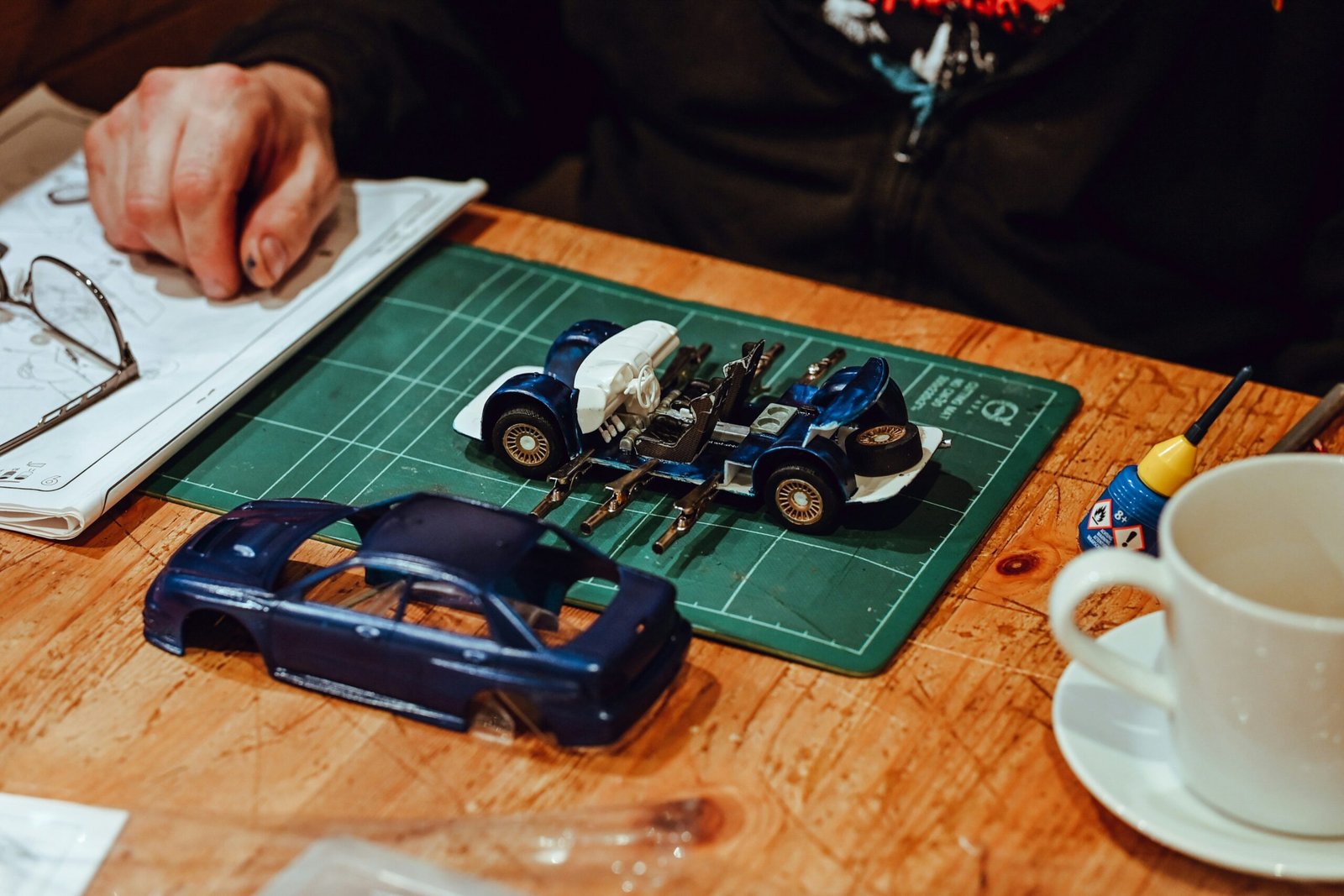Boosting Mental & Physical Health Through Enjoyable Activities
Introduction
When some of us think of hobbies, we reflect back on a different time, a time without Netflix, Facebook, smartphones and the constant bombardment of algorithm-driven junk and constant notifications about things the tech companies want you to spend your time on. And for me, when I first thought about writing this post and I considered hobbies for men in their 50s, I harked back to things that interested me in my youth such as building and racing my Tamiya radio control cars, making Airfix models and trying to hack games on those first home computers such as the BBC Model B, Commodore 64 or even my old Commodore Amiga.
The thing is, we used to have loads to occupy our minds. So how do we get it back? In this post I cover my top 10 hobbies for men in their 50s and how taking up or rekindling a hobby can be one of the best men’s mental health activities we can do. Read on, maybe there will be something to inspire you.
The Most Popular Hobbies for Men in Their 50s (and Their Health Benefits)
1: Fishing
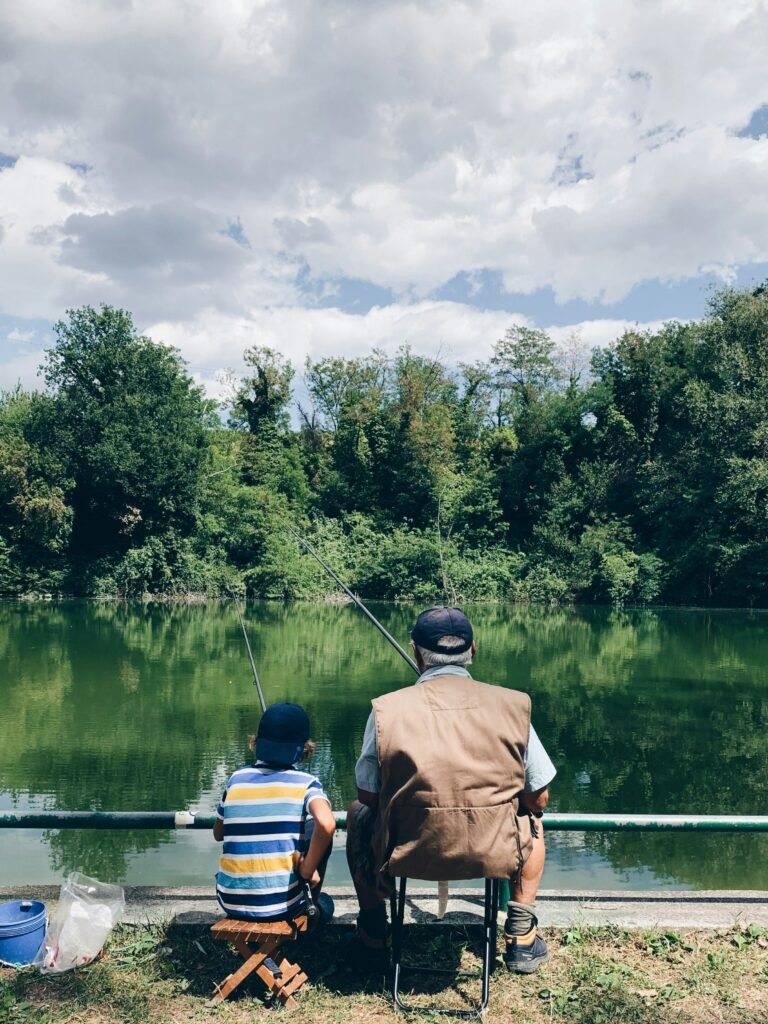
I’ll be honest, I never really got into fishing when I was a kid, I didn’t have that much opportunity for it or indeed a circle of friends who pursued that sort of interest. However now, in the years since I have been married, I have been re-introduced to the sport by two of my brothers-in-law. And now my boys have grown to an age where they actually want to learn it. When I suggest going fishing, they get super keen, drop their devices and grab their rods. Time with them and time in nature is one reason I consider fishing to be one of the best hobbies for men in their 50s or indeed any age. And here are some reasons why.
- Mental Benefits:
- Looking for calm, silence and nature? Then fishing is for you. Being out in nature cleanses the mind. Sharing the time with someone (especially your kids) really gives a sense of completeness. When you catch something, or even better, your kid catches their first fish, you have just created a shared memory that stays with you for life.
- You will be surprised how much kids open up and talk when they are not staring at devices. If you go fishing, be the only one with a phone, give the kids the opportunity to learn, to absorb the moment. Sure, maybe they will just grab a net and try to catch frogs, maybe they will get their line in a tangle and get frustrated. But one thing I know is, my kids remember those times, they talk about them with excitement and that makes me feel good.
- Physical Benefits:
- Light activity, improved focus, connection to the outdoors. All of these can be beneficial to your overall wellbeing and when you share those activities with others, either via a club or with your own family, then the social aspect of it is also healthy.
Don’t know where to start with fishing? This helpful guide can set you in the right direction
2. Walking, Jogging, or Hiking

- Mental Benefits:
- Walking can be boring, right? We all have the feed in our social media telling us to get 10,000 steps a day. Jogging may seem like purgatory for some also, and hiking—well, if you live in a built-up area, where is the joy in that? The truth is, you need to find the one that works for you, the simple activity of walking, jogging or hiking can be relatively cheap, give you time to think, and help to flush those cobwebs from your mind.
Here are some ideas that may help make this physically and mentally healthy activity a little more palatable as potentially one of the most accessible and most popular hobbies for men in their 50s.
- Walk with a mission:
- Whether it be to go to the shop, to do more steps than the day before, or to carry your fishing gear to a new spot. Giving each opportunity to walk a ‘mission goal’ helps take focus away from “I have to do this to stay healthy” to “This is my mission.” Much more satisfying.
- Jog with a goal:
- Similar to the mission in walking, jogging can have its own set of goals. I know of people who tie it in with their trackers to make pictures on maps, who jog to walk the dog or do it because they want to participate in a charity run. Whatever your reason, go beyond the thought “I have to do this” and move to “I want to do this because”—it will help motivate you.
- Hike with a Camera:
- Often from photographers you will hear: to get a beautiful photo, you need to go to beautiful places. This is never truer than when hiking. Make it your goal to get to a spot to take that photo, plan your route, pack plenty of water and the correct clothing, and go for it. Make hiking part of the process and you will appreciate that perfect shot even more.
- Physical Benefits:
- Boosts heart health, maintains mobility and stamina.
Want some inspiration? Check out this video
3. Swimming
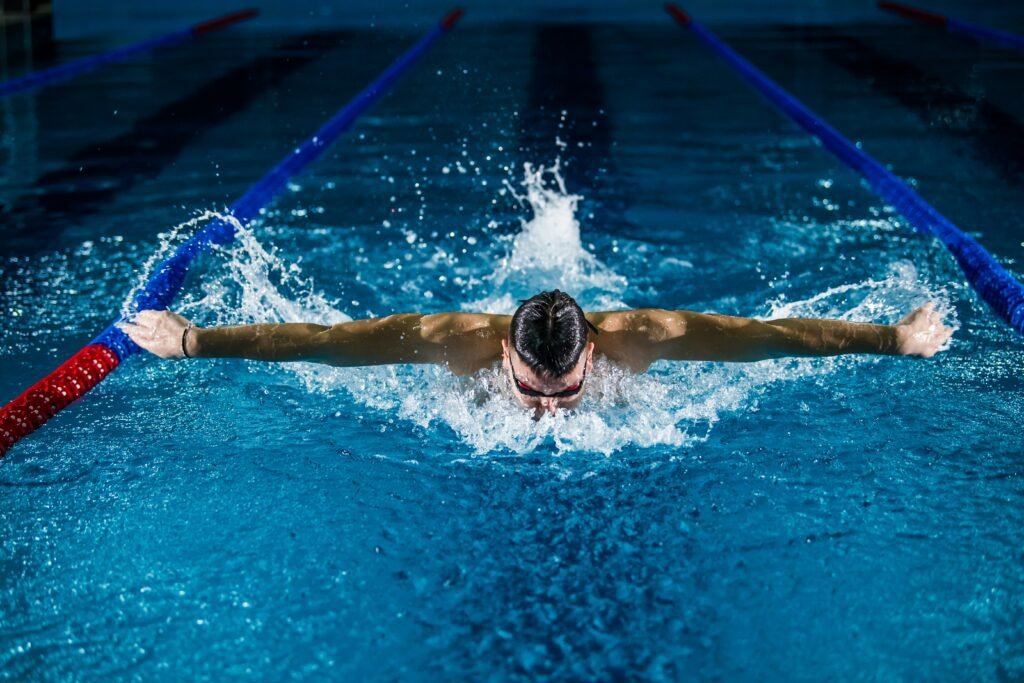
- Mental Benefits:
- For the loners among us, swimming can be a boon. A few laps in your local pool a couple of times a week is very beneficial for your overall physical health and the isolation provided by the elimination of exterior noise and rhythmic movement is fantastic for focusing the mind, giving time for self-reflection and order. It removes you from your devices and stops anyone asking you questions during your swimming sessions. New regular swimmers have noticed a drop in anxiety levels and an overall improvement in physical and mental health.
- Physical Benefits:
- Full-body workout, gentle on joints.
Check this video out to see the benefits
4. Cycling
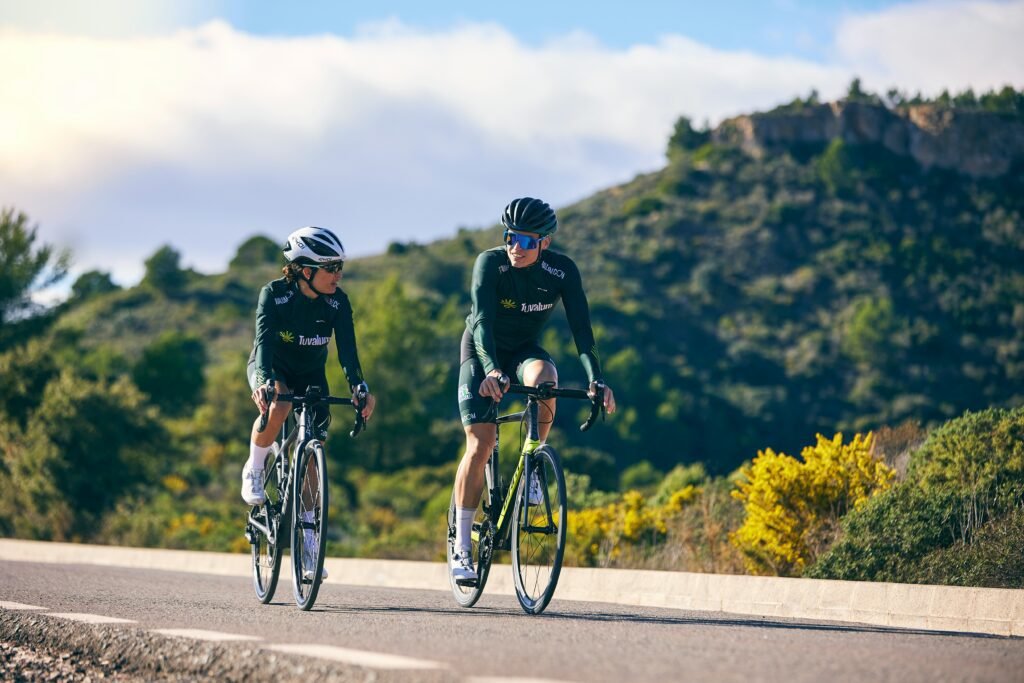
- Mental Benefits:
- If you are lucky enough to live somewhere where there is great scenery, little traffic and long winding roads, then cycling might be something for you. Looking at the scenery promotes mindfulness and helps work through your thoughts and plans. It provides sporadic workouts and rest sessions whilst keeping you moving and it gets you out into the great outdoors.
- Even if you don’t live in a great cycling area, a bike is portable enough that you can take it to one and get out and about. There is also a social aspect to it by joining cycling clubs, challenges to set yourself, and it’s a great way of just getting about. So, what are you waiting for? Get on your bike.
- Physical Benefits:
- Great cardio, easy on knees, builds endurance.
Want to know more about cycling, check this out..
5. Gardening
- Mental Benefits:
- I am not green-fingered at all, safe to say I can kill a cactus within a very short time. Gardening is not for me, but there are great examples of how gardening can reduce stress and even be a huge factor in recovering from mental challenges such as depression and anxiety.
- In fact, one of the most famous gardeners of all – Monty Don – attributes huge therapeutic support to the act of gardening and being out in nature during all types of weather. He has been very candid about how it has helped him cope with depression over the years. So, if you have a space, an allotment or even a window box, why not give it a try? It reduces cortisol and provides a sense of achievement.
- Physical Benefits: Light exercise, vitamin D from sunshine, flexibility.
Don’t just take my word for it, check out this inspiring series from Monty Don
6. Model Building, DIY, or Woodworking
- Mental Benefits:
- Come on, admit it, what man out there does not love getting a Lego kit for Christmas or his birthday? It releases the kid in us, the joy of following instructions and—making something—well why stop there? When we were kids, we all built at least one Airfix kit, radio-controlled car or ship.
- The act of building or just making something out of wood. Just creating, unleashes a kind of primal spirit in us that resonates throughout our wellbeing. People might consider you a bit geeky, a bit nerdy or wonder why you need to build another birdhouse. Your wife may think you are a bit mad. But if it makes you happy, it really doesn’t matter what anyone else thinks.
- Physical Benefits: Improved dexterity and hand-eye coordination.
This video gives a good overview of the benefits of woodwork for example.
7. Learning a Musical Instrument
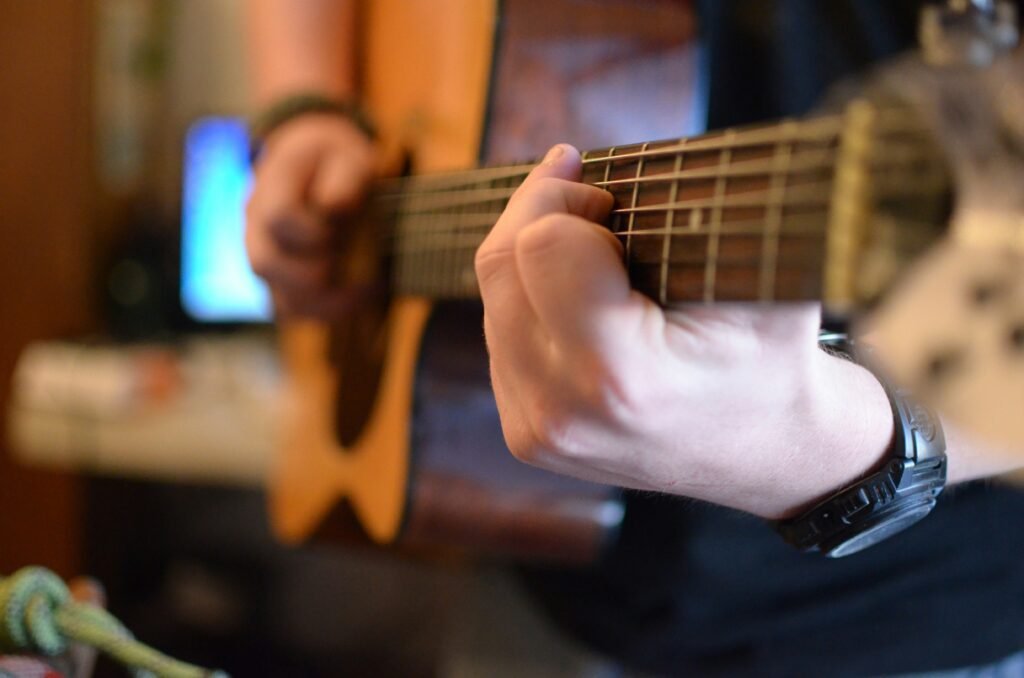
- Mental Benefits:
- In another blog post I talk about the cognitive and mental health benefits of learning the piano. Well, actually learning any musical instrument is good for mental health. If you are a beginner or are picking up a lost hobby, learning and playing music stimulates the brain in many different ways, encourages emotional expression and gives you that isolation time you may want to give yourself. Personally, when I go and practice my piano, I set a 45-minute timer per session and just get lost in the piece I am learning.
- Yes, I still get interrupted sometimes, but then I just pause the session and come back to it later. But by doing this I give my brain a workout and learn something constructive and new at the same time. Also, being guys, being tactile by nature, the feeling of a well-made instrument, be it a piano, guitar, trumpet or whatever, is just really satisfying. There are a lot more aspects to playing than you might imagine, so give it a go, but remember, it’s a lifelong journey. You are not going to be a virtuoso overnight.
- Physical Benefits: Fine motor skill development.
This video shows what happens to the brain when you play music – really worth a watch.
8. Chess, Card Games, and Puzzles
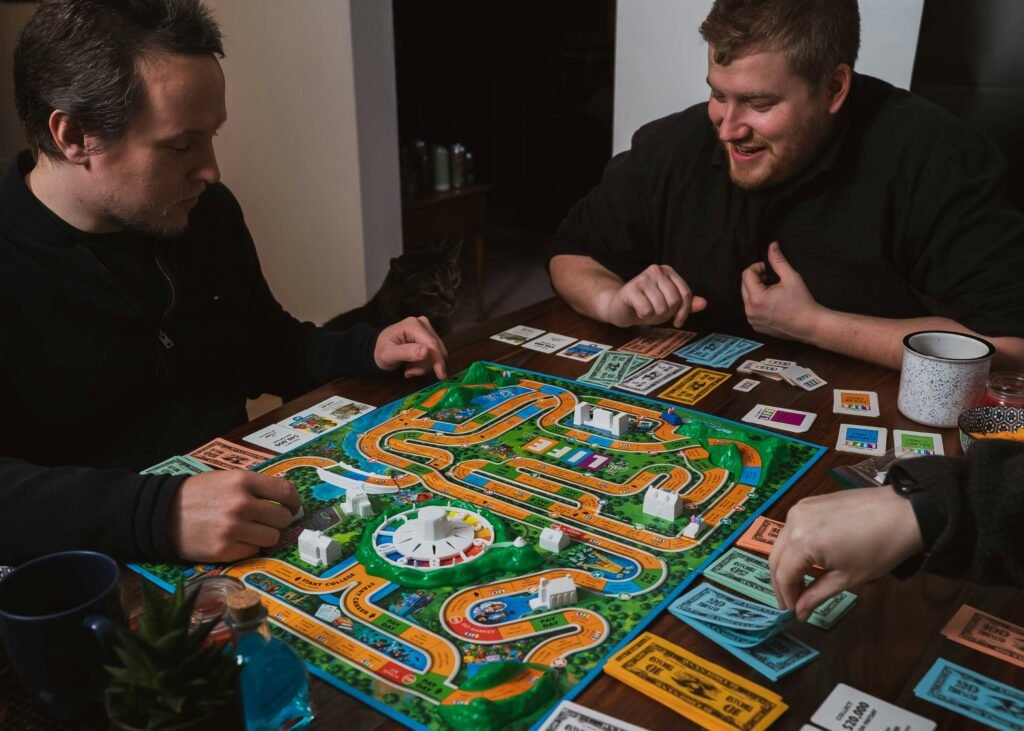
- Mental Benefits:
- Playing chess, card games, or solving puzzles may not seem like the obvious choice for stress reduction and mental wellbeing, but the stimulation of areas of the brain linked to strategic thinking and memory are a tonic for our mental health. Also, success in the games releases dopamine which can raise your mood. Joining a club to play games introduces a social aspect to the hobby, which has its own benefits.
- We are not talking about downloading an app on the smartphone here, but having a physical game to play, opening the box, gathering around and interacting with the other players, whether that be your family or other members of your club. Participating in strategic, social games is a surefire way of moving away from the stress of everyday life and relaxing.
- Physical Benefits: None to really speak of here, but pairing the activity with group events boosts social wellness.
How board games can be beneficial.
9. Photography or Painting
- Mental Benefits:
- There are many aspects of photography and painting that make them great hobbies for men in their 50s, or any age or gender for that matter. Self-expression, mindfulness, personal growth are all part of these creative arts, but there is also the technical aspect of using the right tools for the process, the composition, the rule of thirds, leading lines, positive and negative space, the list goes on. Both painting and photography can be tied with other hobbies such as hiking, sports and travel and can add an extra element to each of these.
- Don’t rely on the pre-programmed auto modes in your phone and try out a real camera, enjoy how it feels, play with the lenses, experiment and you will find yourself pulled into something creative, technical and enjoyable. If cost is an issue you can get second-hand gear online quite readily or maybe you have an old camera sitting around somewhere. Pick it up, give it a go and you may be amazed at what you can achieve.
- Physical Benefits: Walking/hiking for photoshoots, fine motor skills.
In this video, how photography can help with mental health is explained in detail
10. Volunteering
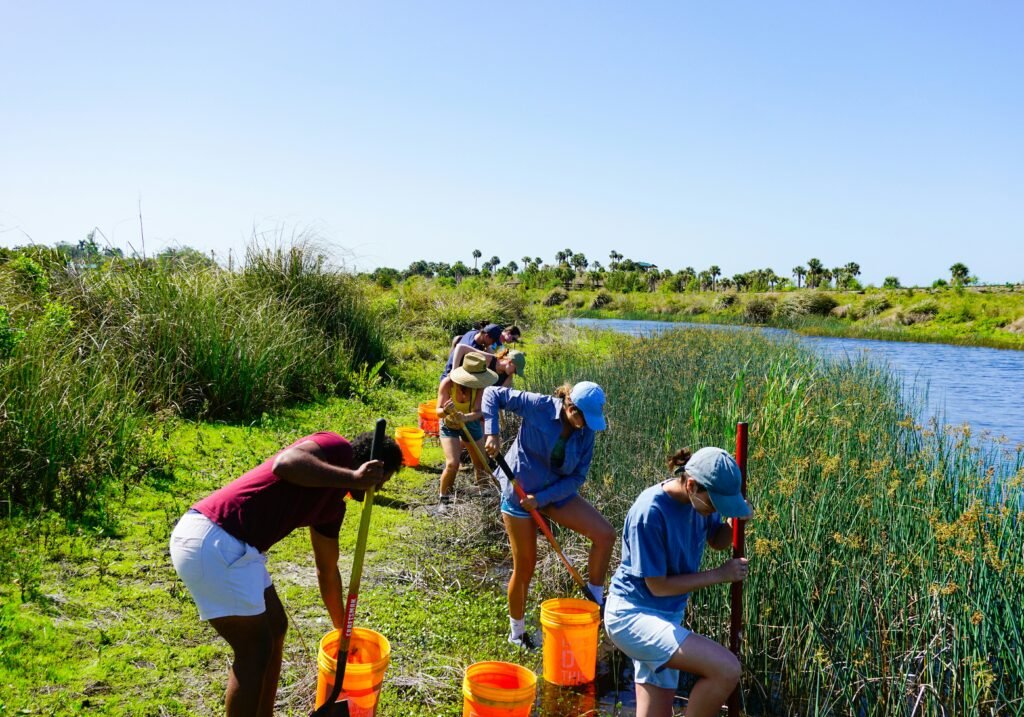
- Mental Benefits:
- Can volunteering be a hobby? Well, it can not only be that but it can be an extremely satisfying and surprisingly fulfilling pastime that opens up opportunities and gives a whole new sense of purpose. About seven years ago I was at a fair that was being supported by the British Scouts Overseas. I got talking with one of the leaders about involving my daughter in scouts and one thing led to another and I have been an assistant leader in scouting since then.
- All three of my kids have gone through scouting and I have been involved with the young people, helping them learn new skills, supporting them in projects, working online with them during Covid, and attending many camps and outdoor events. I can’t stress how satisfying it is to help these kids learn about the outdoors, learn new skills and see them just be kids—without a phone or console or computer in sight. I have learned a lot myself, such as first aid, safety and risk planning, how to handle specific social needs and generally made a lot of contacts in the scouting community with people who have similar interests.
- It has been very emotionally rewarding and I still get a warm “hello” from some of the teenagers at my daughter’s school who I met through scouting. This is just one example of volunteering but something that gave me a profound sense of purpose, broadening my horizons and giving me an unexpected community connection.
- Physical Benefits: Activity, walking, social stimulation.
Here is a quick message from Bear Grylls thanking the BSO volunteers
Why Hobbies Matter After 50
- Stress Reduction: Time spent on enjoyable activities lowers cortisol and helps the body relax.
- Improved Mood: Physical and creative pursuits release feel-good hormones.
- Cognitive Engagement: Challenging the mind keeps it sharp and resilient.
- Social Connection: Group hobbies foster friendships and ward off loneliness.
- Sense of Accomplishment: Completing a project or learning a skill boosts self-esteem and purpose.
- Emotional Expression: Hobbies offer a healthy outlet for feelings.
Tips to Get Started
- Reflect on what you enjoyed as a child or young adult—interests often resurface.
- Start small: Try a beginners’ workshop, watch a YouTube tutorial, or join a local club.
- Invite friends or family—or go solo for personal reflection.
- Set simple goals: One new activity a month or a weekly “me time” commitment.
Let me know what you think
I Sincerely hope some of this resonated with you and may have inspired you to go and take something up. We all need a little headspace and time to do something for ourselves. If you have any other suggestions for me for future posts on the subject or just want to chat, drop me a line in the comments and I’ll get back to you as soon as I can.
Take care, Jon

